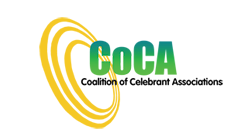When the principles upon which this program was based were changed at the beginning of the last decade, civil celebrants were challenged by the then Attorney General, Darryl Williams to form a ‘peak body’ to gain self regulation.
This challenge was picked up by many associations and individual celebrants alike. The National Council came into being at the instigation of a large number of associations. Meetings in Canberra were attended by Attorney Phillip Ruddock and his dept.
Following change of Government, further support was sought from Attorney General Robert McClelland who again reinforced the necessity of all celebrant associations forming a peak body.
Since Coalition of Celebrant Association’s inception in 2008, the Marriage Law and Celebrant Section has continued to work with the Coalition to strengthen the relationship between the two bodies. A positive outcome of this work was the agreement to a Memorandum of Understanding between CoCA and the Attorney-General’s Department.
The Memorandum of Understanding says: – liaison to consult with and to be consulted by the Attorney-General and the Attorney-General’s Department on matters relating to marriage celebrancy;
The protocol says: 16. Subject to paragraphs 17 and 18, AGD will endeavour to keep CoCA appropriately informed about and consult on:
(a) changes to the Program aims, objectives or operation (whether legislative or otherwise)
(b) broader matters that may impact on the Program or marriage celebrants
(c) planning or review process and timelines, and
(d) opportunities for input and consultation.
CoCA understands the change from a “community-service needs based” model to a “business” model of civil celebrancy brought massive changes in the appointment and regulation of Commonwealth celebrants, and in the staffing and roles of the Department. This shift has brought more than its fair share of confusion and frustrations for everyone in this sector, as well as the benefits of having formal training and ongoing professional developmentstrategies in place.
CoCA also sees the struggle of both groups to steer civil celebrancy towards a “professional” model as a positive move in the evolution of celebrancy.
The Coalition recognises too that the many changes in the MLCS makes it difficult for newer members to build upon the relationship their previous colleagues have had with CoCA.
CoCA recognizes and appreciates that the MLCS staff have given CoCA increasing opportunities to give feedback on various aspects of their work. It was unfortunate that this major change of “Cost Recovery” was not able to be discussed with CoCA prior to the decision by the government to apply that to Commonwealth Marriage Celebrants.
CoCA’s definition of consultation is “discussion prior to decision making”. In addition, for that process to be truly effective and efficient and result
in action plans that meet the needs of both parties of a relationship, CoCA considers the discussion needs to be more than a one-off exchange.
CoCA wants to “worki in partnership” with the Attorney General’s Department. By this CoCA means an ongoing dialogue between the two bodies, and CoCA being an active part of refining proposals to a point of mutual agreemen, where ever possible.
Meetings with the MLCS and with Louise Glanville since the last meeting CoCA had with the MLCS have been productive and encourage us to believe that a stronger working relationship can be developed.
CoCA has a variety of expertise amongst its delegates from other walks of life and access to celebrants who are also experienced teachers, lawyers, nurses, educators, counselors, business people, academics and trainers to name a few.
Working in partnership will bring this expertise to the Department so that Australia can increase the professionalism of celebrants in the most effective and efficient way for the benefit of all Australian families.
RECOMMENDATION 1:
That CoCA and Attorney General’s Department continue to work together to build stronger consultation processes so that Coalition can work in partnership with the Marriage Law and Celebrant Section in developing the Commonwealth Marriage Celebrant Program.


